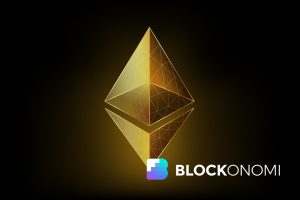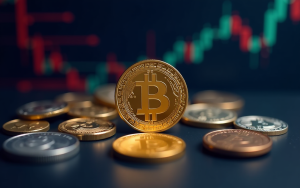1 Million Unique NFT Buyers

Ethereum, the second-largest blockchain, officially reached the 1 million unique NFT buyers mark on Sunday, seven years since the first NFT was minted on Ethereum blockchain.
As rival ecosystems have seen formidable growth, threatening Ethereum’s dominance, the announcement shows that Vitalik’s offspring still lead the NFT game for the time being.
According to the most recent estimates, Ethereum has now seen over one million NFT buyers on its platform as the network’s gas fees have dropped dramatically since August 2021.
Strange Ethereum Market Currents
The fact that Ethereum’s average transaction fee is decreasing indicates that investors are losing interest in the ecosystem’s engagement.
This will be a significant obstacle to the blockchain’s revival and progress.
On the other hand, it portrays a positive impression of people being able to readily access and explore DeFi and NFT areas.
The Ethereum milestone does not include phony buyer accounts, but rather actual people with accounts who make purchases on the blockchain.
Aside from the historic occurrence, data of the last 24 hours revealed that NFT sales on Ethereum surged by 36.06%, outpacing the growth of any other blockchain with at least US$100,000 in sales over the same time frame.
No Longer a Lonely Market
“Ethereum killers,” like Solana or Polkadot, are expected to take over Ethereum. These projects also gained traction last year, with large amounts of investment and public attention.
The second-largest blockchain is often criticized due to its expensive fees and slow transaction speeds.
Meanwhile, the current Proof-of-Work mechanism consuming a lot of energy is also bad for the environment.
JP Morgan warned in a statement that Ethereum’s dominance was at risk due to the high fee, losing market shares to other blockchains.
To wit,
“What has been striking during this month’s correction is that Ethereum has not managed to re-capture market cap share vs. its main competitors as its price declined by a similar magnitude to smaller altcoins.”
Reduced transaction fees are unavoidable if the network aims to develop and grow efficiently.
Otherwise, it is no different from the standard centralized system. Unfortunately, since July 2020, transaction fees on the Ethereum network have been consistently high.
Despite the fact that this transaction fee only applies to small-scale transactions, it is Ethereum’s vulnerability that presents potential for alternative blockchains such as Binance Smart Chain, Terra, Avalanche, or Solana. Some DeFi protocols have shifted to these alternatives.
The famous CryptoKitties development team opted to leave after being greatly impacted by Ethereum’s poor scalability.
Never Was a Perfect System
Many experts, unlike JP Morgan, feel that alternative networks will not be able to challenge Ethereum’s dominance.
The average transaction fee for Ethereum has dropped to $11, a significant decrease from early January.
Although it is not the lowest available in comparison to Solana’s, it is still a positive indicator, particularly for those familiar with the Ethereum blockchain.
Clearly, Ethereum 2.0 is the long-term approach that Ethereum is pursuing. It supports the expansion of the Ethereum network, reducing the current barrier.
This also means that the gas charge that customers on the same network need to spend will be more optimal.
Ethereum is working to meet the Ethereum completion deadline. Ethereum is shifting to a more sustainable mining model: Proof-of-Stake (PoS).
Ethereum’s developers believe that after the transition is complete, the new mechanism will improve the project’s position in the crypto sector.
Change is impossible since records are made to break. Although Ethereum remains king, there is no denying that the blockchain’s dominance in the NFT industry has weakened.
As more money pours into the NFT ecosystem, Ethereum will struggle to cope with due to its lack of scalability and appropriate fee structure.
According to the experts, the second-largest cryptocurrency project would most likely update its network in 2023. At the present, other blockchains still have an opportunity to catch up with this second-largest player in terms of scalability.












